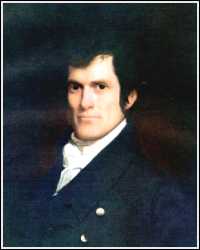TocDocuments
Essays
Biographies
Presidents
About
Project
Awards
The team
Contributions
Info
Disclaimer
Copyright
Sponsoring
Navigation
Guestbook
Printing
A Biography of John Caldwell Calhoun (1782-1850)
*** Quote ***
 March 18, 1782 in South Carolina, Calhoun was born, and educated at Yale
College.
From 1808 to 1810 an economic recession hit the United States and Calhoun
realized
that British policies were ruining the economy.
March 18, 1782 in South Carolina, Calhoun was born, and educated at Yale
College.
From 1808 to 1810 an economic recession hit the United States and Calhoun
realized
that British policies were ruining the economy.
He served in South Carolina's legislature and was elected to the United States House of Representatives serving three terms. In 1812, Calhoun and Henry Clay, two famous "warhawks", who preferred war to the "putrescent pool of ignominous peace", convinced the House to declare war on Great Britian.
Calhoun was secretary of war under President James
Monroe from 1817 to 1825
and ran
for president in the 1824 election along with four others, John Q. Adams,
Henry Clay,
Crawford, and Andrew Jackson.
However, Calhoun withdrew from the race, due to
Jackson's support, and ran for vice president unopposed.
Calhoun was vice president of the United States in 1824 under John Quincy
Adams and
was re-elected in 1828 under Andrew Jackson.
Jackson was for the Tariff of 1828 and caused Calhoun to be opposed to
Jackson,
which led to Calhoun's resignation in 1832. Because he could not do anything
about Jackson's views toward tariffs, which benifitted only industrial North
and
hurt slaveholding South, John C. Calhoun became the only vice president to
resign.
Calhoun wrote an essay about this conflict, "The South Carolina Exposition and Protest", in which he asserted nullification of federal laws, and in 1832 the South Carolina legislature did just that. The next year in the Senate Calhoun and Daniel Webster opposed each other over slavery and states' rights in a famous debate. In 1844 President John Tyler appointed Calhoun secretary of state. In later years he was reelected to the Senate, where he supported the Texas Annexation and defeated the Wilmot Proviso.
John Caldwell Calhoun died in Washington, D.C. on March 31, 1850 and was buried in St. Phillips Churchyard in Charleston. In 1957, United States Senators honored Calhoun as one of the five greatest senators of all time.
for From Revolution to Reconstruction - an .HTML project.
Last update: 2025-4-14 time: 12:52
© 1994- 2007. All rights reserved.
Department of Humanities Computing